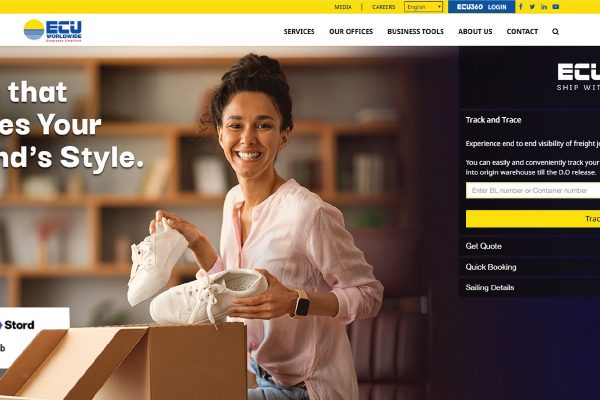With changing times, companies have modified their customer service strategies. Going beyond delivering a service, it’s now a quest to deliver an experience to the customer. Adarsh Hegde, joint managing director, Allcargo Logistics shares his thoughts on being customer-focused
From my stint of over two decades with Allcargo, with several customers around the world, I can sum up my experience through a quote by management guru Zig Ziegler: “If people like you, they’ll listen to you; but if they trust you, they’ll do business with you.”
Customer first
In a B2B ecosystem like ours, customers are more empowered. They are bigwigs, and engagements with them are of higher value. A lot is at stake, sometimes an entire business. These customers range from MNCs to PSUs, and are of the likes of Fortune 500 companies. How does one provide them not just a service but an experience that is personal, to establish a long-lasting relationship?
Vertical-wise surveys, feedback and insights are all norms which are discussed and diligently implemented. But one cannot undermine that a customer feedback goes beyond these surveys. It is a landmark of a strong relationship, nurtured over years. Even functions that do not directly interact with customers influence the customer centricity. At every touchpoint, your employees can influence your customers, right from security guards to the front-desk executives; each individual is instrumental in creating a unique customer experience. How does one establish such a culture in an organisation?
Connect to delight
Delighting your customer is simple, and no rocket science. All we need to do is ask relevant questions.
Customer acquisition is just the beginning. I cannot think of a company that does not foster a customer-focus culture. What makes the good companies stand out? Perhaps, a constant involvement and engagement with customers that goes beyond the routine feedback and reviews. Involving the customer in your new initiatives like a new product or a tool development or taking their personal opinion in a process improvement can do wonders. It is important to gauge that a customer’s journey varies from time to time. Their business is also bound by regulations and the changing economic scenario. Can you do something to help them out? These actions not only exceed your business deliveries but also leave a mark on him. For example, at our organisation, the contract logistics team has been providing consultation to the customers of other verticals for GST.
Ahead of the curve
At the same time, it is also important to understand that companies operate differently. Do we have our sales team mobilised to optimise solutions based on the needs of different customers? Allcargo’s CFS was one of the first to install RFID technology many years ago. It set a trend and many followed us after that. The first-mover advantage has not just helped our customers but the entire industry. Fostering relationships can take a number of years. Being available for the customer throughout the journey at various touch points will win you appreciation. Just pushing your product hard can cost you a great deal of business, and possibly a valuable client. Instead, just focus on providing advocacy if the situation demands.
Take a 360-degree view. Companies like ours work with several layers of customers. By means of word-of-mouth, they can make or break our reputation. Accounting for their views and reorienting them into the system, time and again, does not take much effort and offers a lot more in return.
On the other hand, we may not have direct access to the end-customers in certain cases. In reality, the end-users are those who return to buy our services again, they could be both direct and indirect. This is a challenge as well as an opportunity. Nurturing a relationship with partners becomes all the more necessary in business like ours. Assisting them during a crisis, even if it is beyond your business ambit, garners a lot of goodwill. In future, such a relationship is more likely to turn to you for business prospects. Are we training our people for a 360-degree view? At our CFS, we ensure that the custom house agents get equal facilities as our colleagues. They are as much a part of our business system.
Grow together
As an industry and as a company, we have faced a set of challenges from time to time. We have acquired several companies over the years without losing a customer. In fact we enjoy good relations with them. In an industry, we have always been vocal about issues that concern us. It is the goodwill of over two decades that has kept people on our side.
Being ethical is important. Company’s values such as honesty, integrity and transparency are as much for customers as for employees. Safeguarding your customer’s data and feedback is a sign of a responsible organisation. Consulting your customers when you undergo a crisis leads them to have faith in your services. I recall an incident when we faced a minor mishap while delivering a cargo. The customer was happy to bail us out of trouble when we shared the concerns with him.
Designing a customer experience requires interactions at different levels, even in the time of negative feedback. Are we instilling the values of a negative feedback enough among our people?
Create a culture
Involve everyone. Committed and engaged employees will lead you to engaged and committed customers. It is vital to have your employees buy into the philosophy of customer centricity. Nurturing happy customers is not the job of just the customer service team, but the entire organisation. Remember, there are multiple routes a customer takes to reach you – email, visit to the store, personal meeting, social media, etc. Is there a protocol on creating a holistic experience that employees follow? Training programmes for employees and regular interactions help them understand the importance of creating delighted customers. Right from acknowledging mails to returning calls till the closure of deals and beyond, you have the ball in your court to win your customer. It is also crucial to devise strategies that account for cultural differences if the company has global operations. Understanding ethnic diversity will help produce better customer engagement strategies. Is your system attuned to handle global diversity?
Customer service is a journey in itself. It often takes years to develop a culture. Business is done later, first the relationships are built. Nothing speaks louder than the patronage of a satisfied customer. Therefore, invest in creating successful relationships. In an era where companies are technically advancing, it is far easier to connect with your customer. But take my word, nothing can measure the effect of reaching out to them and keeping in touch.
At Allcargo, we have inculcated this philosophy deep within our values. That is one of the primary reasons why we have set a benchmark in the industry.














